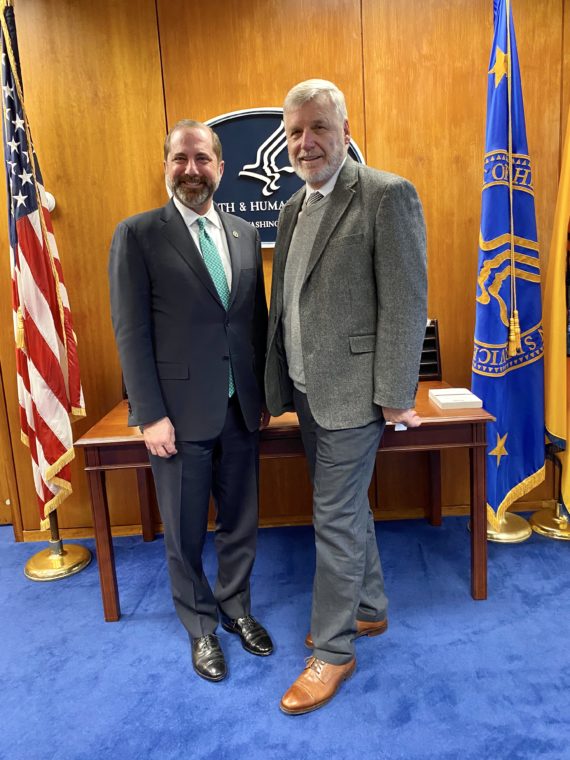
(2-7-20) Health and Human Services Secretary Alex M. Azar II told me during a 45-minute meeting that he intends to focus on improving mental health services.
I was invited to share my family’s story with Secretary Azar and Assistant Secretary for Mental Health and Substance Abuse Dr. Elinore McCance Katz and Shannon Royce, Director of the Center for Faith and Opportunity Initiatives at HHS, at the invitation of Laura C. Trueman, director of HHS Intergovernmental and External Affairs.
I cited my family’s frustrating struggle to get help for my adult son, Kevin, to illustrate barriers that Americans face.
I recounted how I had rushed Kevin to an emergency room during a psychotic break, only to be told that he was not considered dangerous enough to be hospitalized and treated. After we were turned away, my clearly delusional son broke into an unoccupied stranger’s house to take a bubble bath and was arrested and charged with two felonies.
Azar said he had heard similar stories from other family members and asked how HHS could help break roadblocks to care.
I recommended more funding for community services, adding more inpatient crisis care beds, supporting peer services and clubhouses, and helping develop better state laws that would protect individual rights but not insist that someone become dangerous before a loved one can intervene. We need programs that encourage “zero intercept” [less involvement] with police, I said, so we can shift individuals in crisis away from law enforcement and the criminal justice system into treatment.
I noted that the creation of a national hotline number for suicide – 988 – could be broadened by communities into a mental health hotline where professionals could triage callers and direct them to appropriate services.
I said parents often complain about how HIPAA is misused and, even though housing is under the Department of Housing and Urban Development, I explained that Housing First and Assertive Community Treatment teams have been among the most successful recovery programs I’ve seen when traveling to every state except Hawaii. (Some at HUD do not support Housing First because they believe it is not cost effective and rewards bad behavior.)
Finally, I spoke about the 45 recommendations that the Interdepartmental Serious Mental Illness Coordinating Committee has made to better coordinate mental health services delivered by federal agencies.
The secretary asked pointed questions, listened carefully, and showed specific interest in clubhouses, as well as, reviewing the dangerous criteria.
I left the meeting feeling grateful that Sec. Azar had met with me and hopeful that he will follow through with much needed improvements in our badly fractured system.
It’s a daunting task.



